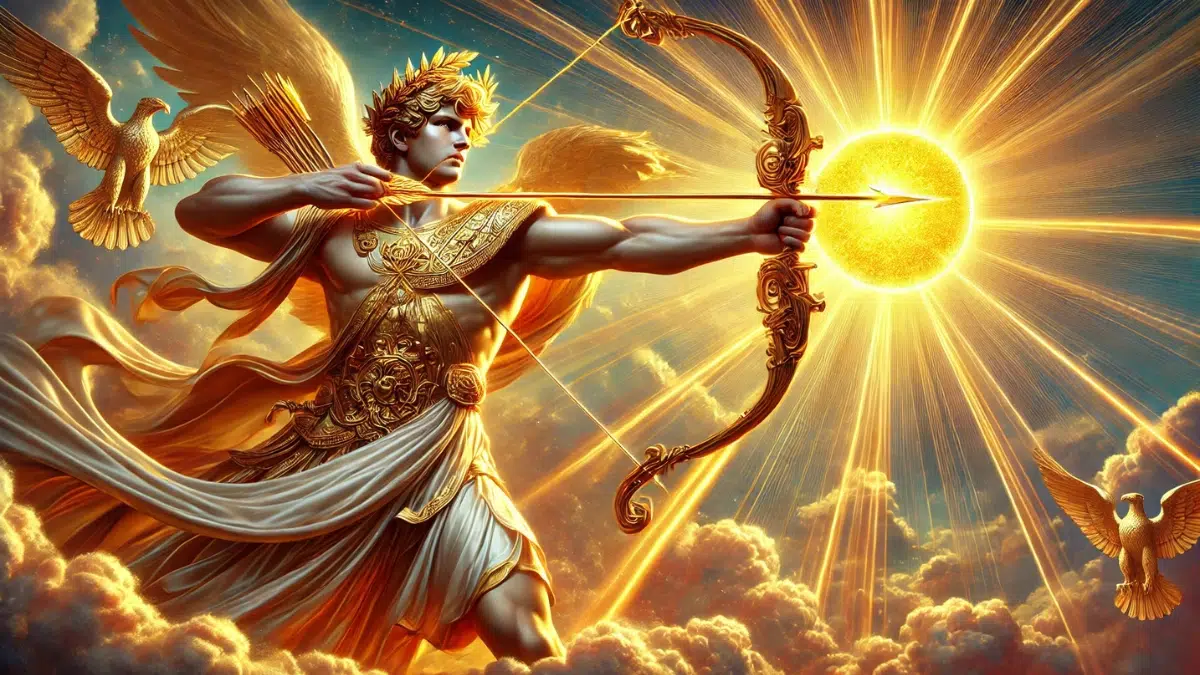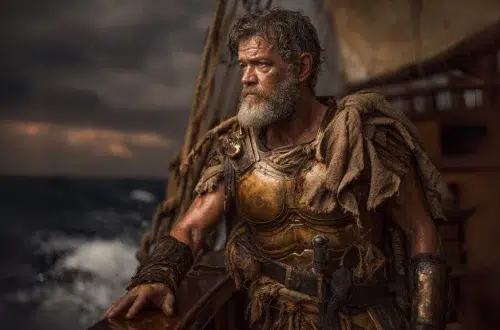
Athena Goddess of Wisdom & Strategic Warfare
Athena goddess of wisdom and war, stands out as one of the most powerful and respected goddesses in Greek mythology.
She rules over wisdom, war strategy, and crafts. People see her as a protector of cities, especially Athens, which takes its name from her. Athena also represents courage and justice.
She plays a big role in many Greek stories, helping heroes like Odysseus and Perseus on their adventures. She also guides heroes like Heracles, Bellerophon, and Jason.
Her symbols are owls, olive trees, and snakes including a Gorgoneion (three snake-haired sisters) to ward off evil.
In art, she wears a helmet and carries a spear.
The ancient Greeks build many temples for Athena, with the Parthenon in Athens as the most famous. This shows how important she is in their culture.
They also hold festivals like the Panathenaea, celebrating Athena with games and offerings.
Today, Athena still captures our imagination, reminding us of the power of wisdom and justice. Her stories continue to teach and inspire people all around the world.
The Birth of Athena

Athena has a unique and exciting birth story that captures the imagination. According to Greek mythology, she doesn’t have a mother in the usual way. However some note that Metis, the first wife of Zeus, is her mother.
One version says that Zeus, the king of gods and her father swallows Metis. This after he was told Metis would bear a son mightier than him.
In another version Athena is said to spring fully grown and dressed for battle from the forehead of Zeus. This happens after Zeus experiences a massive headache. Hephaestus, the god of blacksmiths, splits his head open with an axe to relieve the pain.
Suddenly, Athena appears, shouting a war cry. This dramatic entrance shows Athena’s strong connection to wisdom and warfare right from her beginning. She is known as a fierce and strong goddess.
Being born full-grown and armed sets her apart from the norm. This noting that she is an independent and mighty force in the mythological world.
It also highlights her important status among the gods, as she is a favourite daughter of Zeus.
This special birth marks her as a protector and strategist. These are roles she carries throughout the myths involving her.
Athena’s origin story is not just about where she comes from, but it also sets the stage for her powerful influence in Greek mythology.
Athena’s Attributes
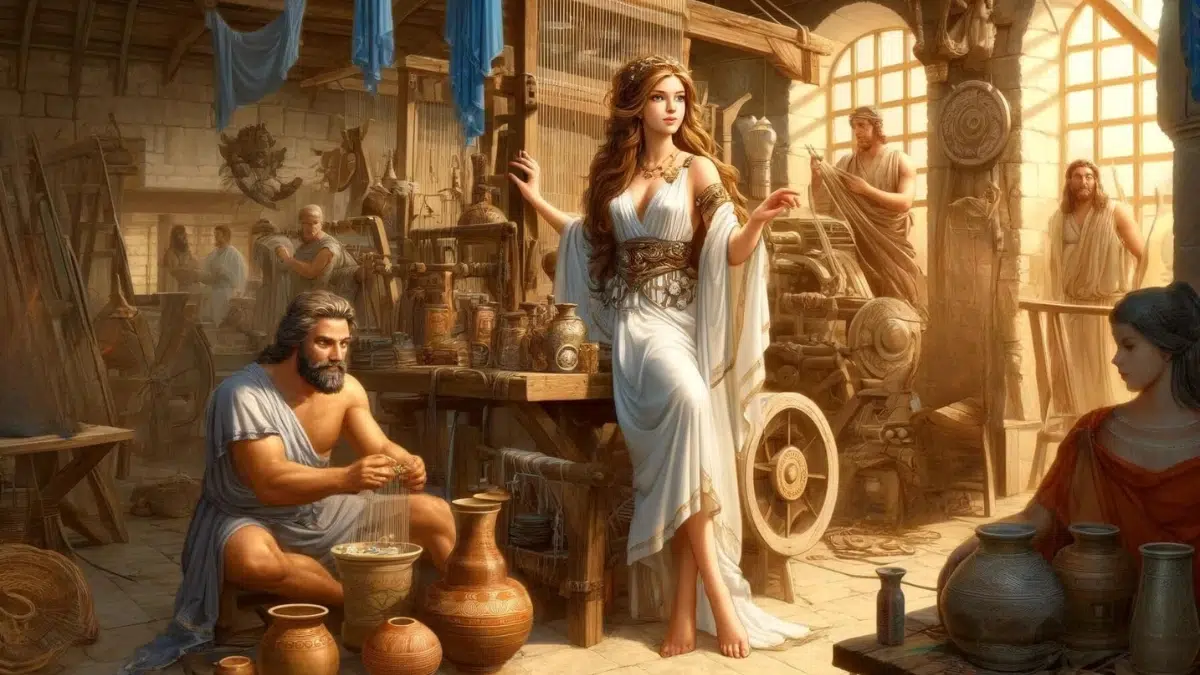
In Greek myths, Athena was known by many names that showed her different skills. She was often called Pallas, which means “girl” or “young woman.”
Parthenos was another name, meaning “virgin.” This shows that she was a goddess who didn’t marry.
She was also called Promachos, which means “of war.” This name points to her as a strategic war goddess. She led troops to battle under the name Athena Promachos.
Athena was known as Ergane too, which means “of the crafts.” The goddess is the protector of craftsmen and weavers, known as Ergane. This name shows she was a patron of skilled work.
Athena wasn’t only the goddess of wisdom and war. She was also about being good at making things and leading soldiers.
Great artists and writers portray her and show that Athena was about smart tactics in both battle and peace. Athena’s diverse names represent her many roles.
Athena’s Symbols

Symbols Representing Goddess of War
Her key symbols for battle are the aegis (shield), helmet, spear, and armour, with the armour and a spear showing Athena’s role as a goddess of war.
She wears armour to protect herself in battles, ready to defend the righteous. Her spear helps her lead warriors to victory.
A Gorgoneion is a mythical symbol featuring the head of Medusa, one of the three snake-haired Gorgon sisters. Athena often uses this symbol on her shield and armour to ward off evil and protect herself and her allies in battle. It represents Athena’s power to protect and intimidate.
Athena’s shield, called the Aegis, sometimes features a fringe of snakes, emphasizing her protective power.
Other Symbols Reflecting Her Wisdom

The owl represents wisdom.
It sees things in the dark, symbolizing Athena’s ability to see the truth and guide people wisely. This bird often appears with her in art, showing her wise nature.
The olive tree stands for peace and prosperity. Athena gave this tree to the city of Athens as a gift. It provides food, oil, and wood, helping the city thrive.
Snakes, or serpents, often appear in stories about Athena, symbolizing regeneration and protection. These creatures guard sacred spaces and embody wisdom.
Horses also link to Athena, showing her connection to strength and speed. She helps heroes who rely on these noble animals in their quests. Horses symbolize the victory and valour that Athena champions in battles.
These creatures—owls for wisdom, snakes for protection and renewal, and horses for strength—further illustrate Athena’s diverse roles as a goddess. They highlight her abilities to guide, protect, and inspire those who seek her help.
All these symbols reflect Athena’s complex character. They combine her aspects of intelligence, protection, and nurturing, making her a unique and respected deity in Greek mythology.
Learn more about Greek Symbols: Greek Mythology Symbols
Myths Involving Athena
In Greek mythology, Athena is known as the patron goddess of heroes. She helps heroes such as Perseus, Odysseus, Heracles, Bellerophon, and Jason, supporting them in their quests and battles.
Poseidon and Athena Compete for Athens

Athena has a special connection to the city of Athens, which even gets its name from her. This bond starts with an exciting competition between Athena and Poseidon, the god of the sea.
Both gods want to become the protector of the new city and they agree to each offer a gift to the people. Cecrops, the King of Attica will decide which is the better gift.
Poseidon strikes the ground with his trident and creates a spring, which provides access to water and possibly trade. However, the water turns out to be salty and not useful.
Athena then steps forward and offers an olive tree. This tree provides the people with wood, oil, and food, proving far more valuable. This tree stood for peace and good fortune.
Impressed by Athena’s thoughtful gift, Cecrops declares Athena the patron goddess of Athens. From that day, they name their city Athens in her honour.
Athena’s victory in this contest shows her wisdom and continues to symbolize her lasting relationship with the city. Poseidon is said to be angry with the decision and later sends his son to cut down the olive tree. However his son dies in the attempt.
This tale highlights why Athena is not just a goddess of war but also of wise counsel and protection.
Judgement of Paris
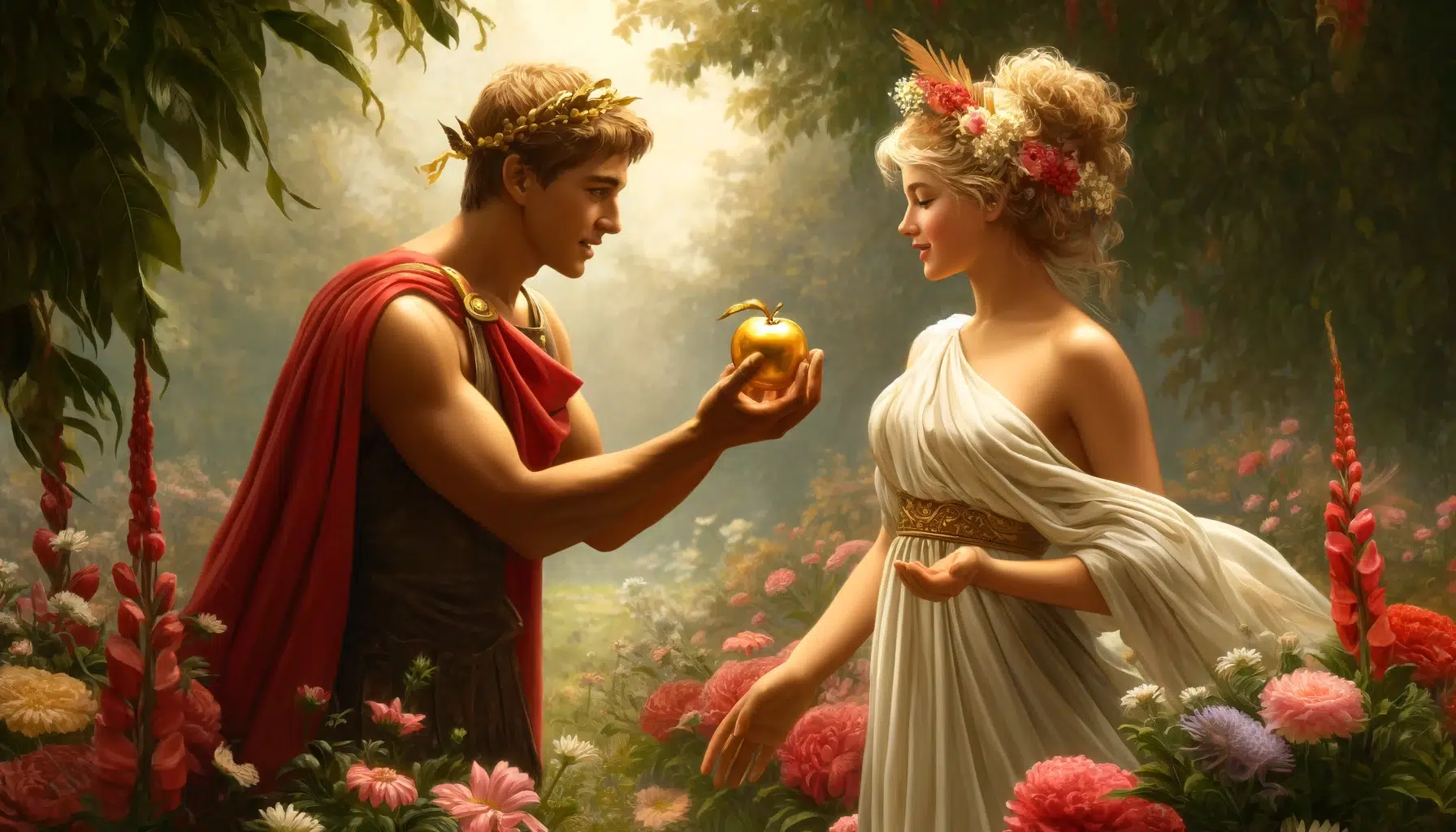
The wedding of Peleus and Thetis, Achilles parents, was to take place. Eris, the goddess of discord was not invited.
In her displeasure, she would throw and apple with the word “fairest” among the goddesses. Aphrodite, Hera and Athena were all the fairest, and ask Zeus to choose.
Zeus did not want to show favouritism so he has Paris, a Trojan prince decide. The goddesses then appear before Paris. Still unable to choose, the goddesses offer bribes.
Hera offers power over Asia and Europe. Athena offers glory in battle. Aphrodite offers the most beautiful woman on earth, Helen, who was already married.
Paris gives the apple to Aphrodite, angering the other goddesses. Athena sides with the Greeks in the Trojan War. During the war, Athena gives strength and wisdom to Greek heroes like Achilles and Odysseus.
Learn more about the Trojan War:
- Achilles: Greek Warrior Hero’s Journey from Glory to Grief
- Hector of Troy: Legendary Trojan Warrior
- Hippolyta: Queen of the Amazons in Greek Mythology
- Paris: Tragic Hero, Villain or Pawn of the Gods
- Penthesilea: Amazon Queen Who Died in Trojan War
- Philoctetes: The Legendary Greek Archer and Healer
Helping Perseus Defeat Medusa

Athena is also known as the patron goddess of heroes.
Perseus, a demi-god and son of Zeus, faces a dangerous task. Perseus is to behead and defeat the monster Medusa. When a malicious king falls in love with his mother, Perseus wants to protect her. The king orders Perseus to bring back the head of Medusa.
Medusa was born a beautiful woman, and considered a temptation by the gods. While in the temple of Athena, Poseidon took advantage of her and she became pregnant.
Athena would curse Medusa by giving her an ugly face and hair made of snakes, and anyone who looks into her eyes would turn to stone.
To help with the quest, Athena gives Perseus a special mirrored bronze shield. He receives other gifts from the gods as well. Winged sandals, a cap of invisibility and a sword.
Perseus finds Medusa’s asleep in her cave. He uses the shield as a mirror to locate Medusa, and to avoid looking directly into her eyes. This clever trick prevents him from turning to stone.
He approaches and uses the sword to cut off her head. He journeys home with the head, using it to turn the king to stone. Thus setting his mother free. This myth shows Athena’s role as a protector and mentor to heroes facing great challenges.
Athena’s help not only ensures Perseus’s victory but also symbolizes her support for bravery and cleverness in overcoming difficulties.
Helping Jason on His Quest to Find the Golden Fleece

Athena also helps Jason, a young hero on a quest to find the Golden Fleece. This fleece is a powerful symbol of kingship and authority, and retrieving it is no easy task.
Jason is to lead the Argonauts, a group of brave warriors, on this daring adventure. He knows that he needs a strong fast vessel for such a long voyage.
Athena steps in to assist Jason with a fast ship, to be built by the great skilled craftsman, Argo. They build the largest, strongest ship in ancient Greece, with fifty oars, for the challenging journey ahead of the open seas. This allows the strongest hero warriors to make the journey.
The ship allows the mast and oars to be removed, and for the ship be brought onto shore. The ship was named Argo after the craftsman. Athena also guides Jason through difficult situations, such as navigating past treacherous rocks and fierce storms.
Her wisdom and support are crucial in helping Jason face various dangers, including fierce warriors and tricky challenges. Athena’s aid reflects her role as a protector of heroes and a goddess who values courage and determination.
She supports those who undertake great quests and face their challenges bravely, just like Jason.
Bellerophon Captures Pegasus

The young hero, Bellerophon has the task of defeating the Chimera, a fearsome creature with parts of a lion, goat, and snake. This challenge is extremely dangerous.
By taming Pegasus, Bellerophon can then fly, making it easier to confront the Chimera from above. This advantage is crucial in his battle against the monster.
While sleeping in the temple of Athena, Bellerophon dreams that Athena puts a golden bridle beside him. When he awoke he understood how to approach Pegasus, while it drank from a well.
Bellerophon was able to mount Pegasus and fly back to Lycia to the Chimera. Athena’s involvement reflects her commitment to aiding those who undertake noble quests and demonstrate bravery.
Heracles With His Twelve Labours

Athena often helps Heracles, a famous hero known for his strength and bravery. To achieve immortality, Heracles faces twelve difficult tasks, known as the Labours of Heracles.
Athena, his half-sister, supports him as a protector, or silent presence, through many of these challenges.
In the 6th labour, Hercules must drive away a large flock of birds by a lake. Athena gives Hercules a pair of magical bronze krotala. These noisemaker are similar to castanets.
Hercules climbs a nearby mountain and clashes the krotala loudly. These were forged by the god, Hephaistos. This scares away the flock of birds. By aiding Heracles, Athena supports the idea that true heroism combines both brain and brawn.
Relationships With the Other Gods

Athena is one of the Twelve Olympians, the group of gods who live on Mount Olympus. As the daughter of Zeus, the king of the gods, she enjoys a special status.
Making her very important in the divine family. Unlike many other gods, Athena never marries or has children. She focuses on giving wise advice and helping heroes.
Her Siblings
Athena gets along well with gods who value wisdom and courage. She shares a strong bond with her half-brother Apollo, the god of the sun and music, and his twin, Artemis, the goddess of hunting. They both value knowledge and the arts.
However, she often clashes with her brother Ares, the god of war, because they both oversee aspects of battle. While Ares loves the chaos and violence of battle, Athena focuses on strategy and protecting warriors.
Despite her powerful connections, Athena stands out because she often acts independently. She doesn’t just follow other gods’ ideas; she thinks for herself.
This independence makes her a key figure in the pantheon, admired for her intelligence, fairness and thoughtful actions. When gods need a judge or a mediator, they often turn to Athena. She solves disputes and helps maintain peace among the gods with her clear thinking and just decisions.
This makes her an essential figure in Greek mythology.
Learn more about Athena’s siblings in Greek mythology:
- Apollo: Exploring the Archer God’s Myths and Legends
- Artemis: Ancient Greek Goddess of Archery
- Ares Quick Tempered Greek God of War
Athena in Art and Sculpture
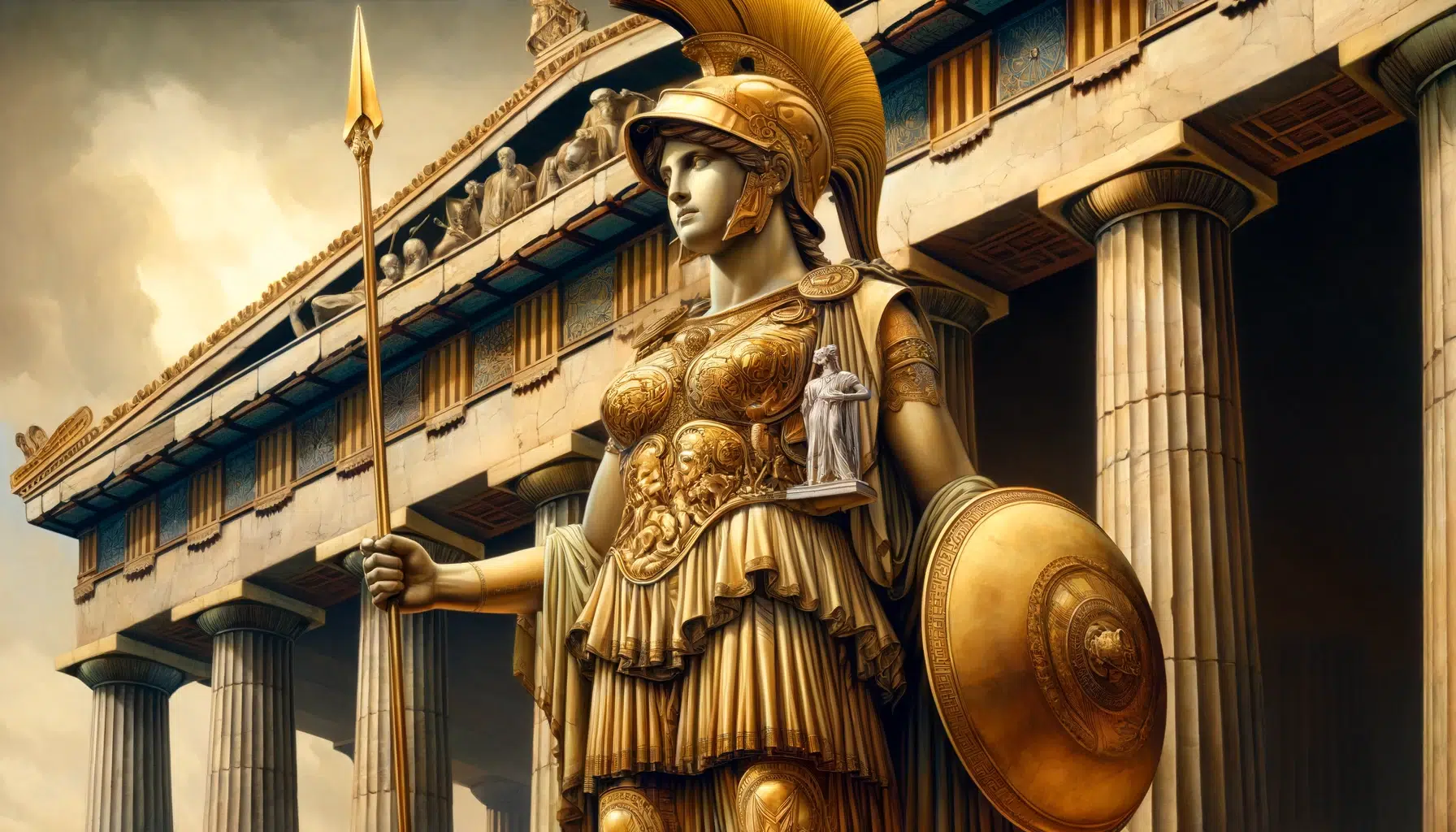
Athena appears often in ancient Greek art. Artists depict her in statues, vases, and reliefs, showcasing her as a powerful and wise goddess. In statues, Athena often wears a helmet and carries a shield and spear, showing her role as a goddess of war.
The famous statue called the Athena Parthenos, once in the Parthenon, was a massive gold and ivory creation showing her in full battle gear.
Vases feature Athena in various mythological scenes, such as helping heroes like Heracles and Perseus. These artworks show her in action, giving advice or aiding in battles, which illustrates her importance in guiding and protecting heroes.
Reliefs, which are carvings on walls or panels, also portray Athena. One popular scene is her birth, emerging fully armed from the head of Zeus. This image symbolizes her readiness and power right from the start.
Overall, these artworks reflect how deeply revered Athena was in Greek culture. They highlight her attributes of wisdom, courage, and warfare, making her a lasting symbol of strength and intelligence in ancient Greek society.
Learn more about: Statue of Athena Parthenos
Connections to Near Eastern Goddesses

In Greek mythology, Athena shines as a powerful warrior goddess. Some think her followers might have seen similarities with other strong female deities from the ancient Near East.
Athena’s skill in war, passion for the battlefield, and strategic mind match qualities of Inanna from Akkadian and Sumerian myths. They also resemble Anat, a goddess worshipped in Canaan.
Their stories and names even suggest that people might view Athena as a guardian of war and cities, much like these older goddesses.
However, solid evidence linking Athena directly to the sun is scarce. This might stem from Greek culture, which didn’t emphasize sun and moon worship as much.
Instead, they prize gods like Athena and Zeus, who reflect their cultural values. Yet, some still associate Athena with the sun symbolically, possibly to highlight the importance of sun worship in various traditions.
Athena’s love for battle and her link to weapons and war tactics closely resemble those of Inanna and Anat. This shows that ideas could have spread between cultures.
Learn more about:
- Legacy of Archers: Women in Greek Mythology
- Women in Archery in Different Cultures
- Women in Ancient Warfare Defying Gender Norms
Athena’s Enduring Legacy
Athena plays a big role in Greek stories and has made her mark in Western civilizations. She represents wisdom, war, and the practical arts. These make her important in Western thought and culture.
Athena’s reach goes beyond the divine world, shaping ancient Greek culture. The Parthenon in Athens is a clear sign of the city’s respect for her.
In a myth, Athena wins the right to be Athens’ patron. She gifts the city an olive tree, a symbol of peace and wealth. Athena’s smart strategies and bravery inspire women today.
Her link with crafts allows her to break old standards in jobs like carpentry and engineering.
Athena often guards heroes and Athens. She is all about smarts and strategy, making her a peace and war leader. Athena’s lasting impact in the West shows her power in wisdom, war, and arts.
Her memory in stories, art, and talks today proves her as an important figure.
Conclusion
Athena, the Greek goddess of wisdom and war, plays a key role in many myths. She helps heroes like Odysseus and Perseus, guiding them with wisdom and strategy.
Athena’s symbols, like the owl and olive tree, represent her connection to wisdom and peace.
Her birth from Zeus’s head shows her unique origin and power.
Athena’s contests, such as the one with Poseidon for Athens, highlight her cleverness and dedication to justice. In art, Athena appears in statues, vases, and reliefs, showing her importance in Greek culture.
The statue Athena Parthenos, once in the Parthenon, stands as a grand example of her revered image. Myths of Athena, like her transformation of Arachne into a spider, teach lessons about respect and humility.
Athena remains a symbol of wisdom, courage, and strategic thinking. Her legacy continues to inspire stories of intelligence and bravery throughout history.


